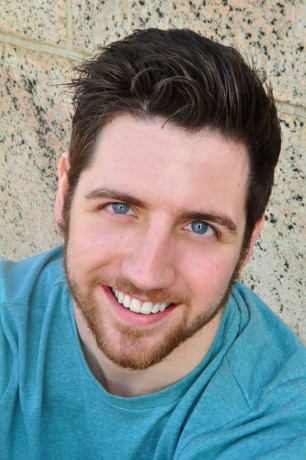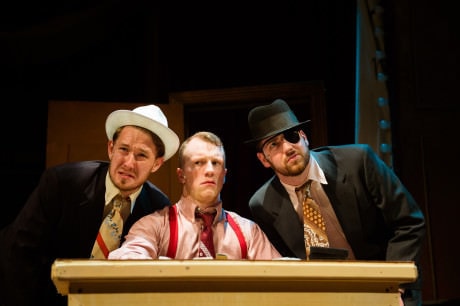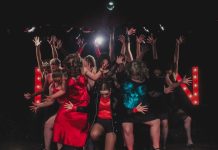In Part 3 of a series of interviews with the cast of The Most Happy Fella, meet Drew Stairs, who plays Joe in Catholic University’s upcoming production, which plays this weekend October 23-25, 2015.

Joel: Introduce yourself to our readers and tell them where they may have seen you perform on the stage or in other local venues.
My name is Drew Stairs, and I am a senior at The Catholic University of America. I am currently pursuing my Bachelor of Music in Musical Theatre. At CUA, I previously appeared in the dance ensembles of Carousel and Sweet Charity. For Catholic’s An Evening with Frank Loesser at The Kennedy Center Millennium Stage, I was a featured soloist. I also starred as Underling in The Drowsy Chaperone and in the ensemble of The Merry Widow. Within our student-run company, Centerstage, I took part in productions of Company as Peter and Parade as Tom Watson. In the area, I recently played Gangster #2/Hortensio in Kiss Me, Kate at NextStop Theatre Company.
Why did you want to be in The Most Happy Fella at CUA? What did you sing at your audition?
I did not know The Most Happy Fella well before preparing my audition. I knew and loved several of the songs, most especially “Somebody, Somewhere”. It was exciting for me to watch the entire production and hear the rest of Loesser’s brilliant score. The music has an easy, timeless feeling and well supports the various storylines seen throughout. For my audition, I sang “Lonely House” from Street Scene, which has a similar opera-crossover sound.
Who do you play in The Most Happy Fella and how do you relate to him or her? What do you admire about your character and what do you not admire?
I play Joe, the foreman of the vineyard and a good friend of Tony’s. At first, I had to ask myself if Joe was the villain in this piece. He is one of two characters that do not appear at the very end of the production (which you’ll have to see to find out why). Upon further analysis and exploration, I actually found Joe to be one of the most relatable characters. He longs to be somewhere else and discover what’s out there, but after making the wrong choice in a heated moment, he spends the entirety of the second act feeling stuck and regretful. Anyone can relate to such an emotional build-up. I admire Joe’s confidence and easiness of character, and while I do not admire the choice he makes in the Act I finale, I understand where it comes from.
Which character that you are not playing is most like you and how and why?
I am probably the most like Herman. He is a loyal, hilarious, and light-hearted guy that gets through every day with a smile. I like to think that I lead my life in such a way, always aiming to look at the positive side of every situation.
How would you describe the score that Frank Loesser has written for this show?
As I said before, this music is truly timeless. Even today, anyone can listen to the pieces from The Most Happy Fella and enjoy every second. Whether it’s a comedic masterpiece (“Abbondanza”), a gorgeous ballad (“Don’t Cry”), or a charming duet (“Happy to Make Your Acquaintance”), Loesser manages to create catchy melodies that are still unique and signature to his style. Some pieces have very challenging harmonies, for instance “Cold and Dead,”which was a thrill to tackle.
What is your favorite song that you are not performing and why?
My favorite song that I am not performing is undoubtedly “Somebody, Somewhere.” I have performed it in the past, and still consider it one of the best pieces in musical theatre. It has a lovely line melodically and lyrically with such ease, hope, and romance that I cannot help but gush over whenever I hear it.
What have been the challenges you have encountered while preparing for your role and how were those challenges overcome?
I am quite different from Joe in terms of my own physicality. Like I said before, my energy relates more to a Herman-type. Our director, Matt, has helped me with advice to ground myself and really think in the mindset of Joe. Although I may approach a situation or interaction one way, Joe is likely going to have a different take on it. Thus, I did the work scene by scene to consider how Joe reacts to everyone and everything around him, both physically and mentally.
How would you describe Pauline Grossman’s choreography and which song’s choreography is your favorite, and which was the hardest to learn?
I have worked with Pauline on a few productions in the past, particularly in the dance ensemble of Carousel, and she is always a blast. Her choreography is always true to the style of a piece, and she takes the time to experiment with the performers in order to feature their best skills. My favorite choreography is on “Big D”, which I am actually not in. However, I always have the pleasure of watching the rest of the cast attack the choreography with exuberance. I dance very little in this production, although I have a bit in “Sposalizio” with some of the other guys that you’ll have to see!
What are your solos in the show and what do we learn about your character when you sing it/them?
My main solo pieces in the show are “Joey, Joey, Joey” and “Don’t Cry”. In the first, the audience learns that Joe is desperate to get out of Napa Valley. He is tired of everything there, longing to move on and find new people (women, in particular). A lovely metaphor is made comparing “the wind [that] blows in the bunk house” to “a perfumed woman”, a strong influence that strengthens my desire to escape each night. “Don’t Cry”, my favorite to perform, shows Joe at his softest, consoling Rosabella and displaying true kindness. This turns into lust and passion as the piece moves forward. “Don’t Cry” finally gives the viewer a look at exactly what the relationship between Joe and Rosabella is.
What does The Most Happy Fella have to say today’s theatergoer and what themes from the show are still relevant today?
The Most Happy Fella consists of themes that are easily still relevant today, despite being considered an “old musical”. At our first rehearsal, Matt, our director, spoke to us about what this show meant both at the time of its release and today. His words to us were quite helpful in building the piece. The lust seen early on between Joe and Rosabella becomes a contrast for the true and deep love seen between Tony and Rosabella. We learn that in order to gain love, one must be selfless and accepting. Love also takes time and maturity to grow. On the other hand, this musical celebrates a community that is deeply rooted in tradition and care for all. Rosabella and Cleo represent a changing world, which these people in Napa Valley have not seen yet. Surely, any audience can relate to the different facets of love and change.
What have you learned about yourself – the actor and singer- during this whole process?
I have learned a great deal about how to truly connect on stage through this process. Whether this involves connection with my own ideas in a solo, or creating that bond with another character in a scene or duet, I feel much stronger in that regard. Vocally, this part sits in a great place for me, so I was able to take it to the next level and consider how to make Joe my own unique character. I have also put a major focus on the importance of breath. Through breath, I have found a connection to Joe that I have never had with any other character. Whether a scene involves easiness, frustration, confusion, or lust, I find that remembering and focusing on my breath takes the character and stakes of the scene to a whole new level.

Why do you think The Most Happy Fella is a ‘hidden treasure’ of musical theater history and why should more theater companies mount productions of it.
The Most Happy Fella requires a classically trained singer. The sounds that are created among each character are simply stunning if done with proper technique. Nowadays, with modern musical theatre being so influenced by pop/rock music (which is also great), such technique is often not thought about. It is refreshing to be taken back to a time decades ago through the sound of a classically trained vocalist. Beyond the vocals, the musical also requires a strong actor, as those deeply rooted connections between characters are essential to creating the lovely story present in the script. More theatre companies should take this piece on because it hones in on every aspect of the musical theatre performer.
What advice would you give another actor who is preparing to play your role in another production of The Most Happy Fella?
For those about to play Joe, I would tell them to remember that he is not a villain. Does he make a bad choice? Yes. But playing up a villain is boring. The audience and the actors beside you are much more interested in a character that makes choices in the moment and can back them up with reasoning. Joe is such a passionate guy with a lot more depth than one may at first assume. Finding such connection has made this one of my favorite parts to play.
What do you want audiences to take with them after seeing The Most Happy Fella and your performance?
I can only hope that the audience will leave The Most Happy Fella with appreciation for this style of theatre. This type of musical is not done often, but needs attention. It is such a beautiful story grounded with a creative, stunning, and exciting score by Frank Loesser. I also hope to find a connection with the audience during my scenes, as that is where the magic in theatre comes from. I want to challenge the audience to consider Joe’s motives, and leave them to think about it even after the piece has ended. If I can affect the audience in such a way, then I’ve done my job.

LINKS:
Meet the Cast of ‘The Most Happy Fella’ at The Catholic University of America: Part 1: Mackenzie Newbury.
Meet the Cast of ‘The Most Happy Fella’ at The Catholic University of America: Part 2: Emma Nadine Onasch.
‘The Most Happy Fella’ Plays This Friday through Sunday 10/23-25 at Catholic University’s Hartke Theatre.
Meet the Cast of ‘The Most Happy Fella’ at The Catholic University of America: Part 3: Drew Stairs.




